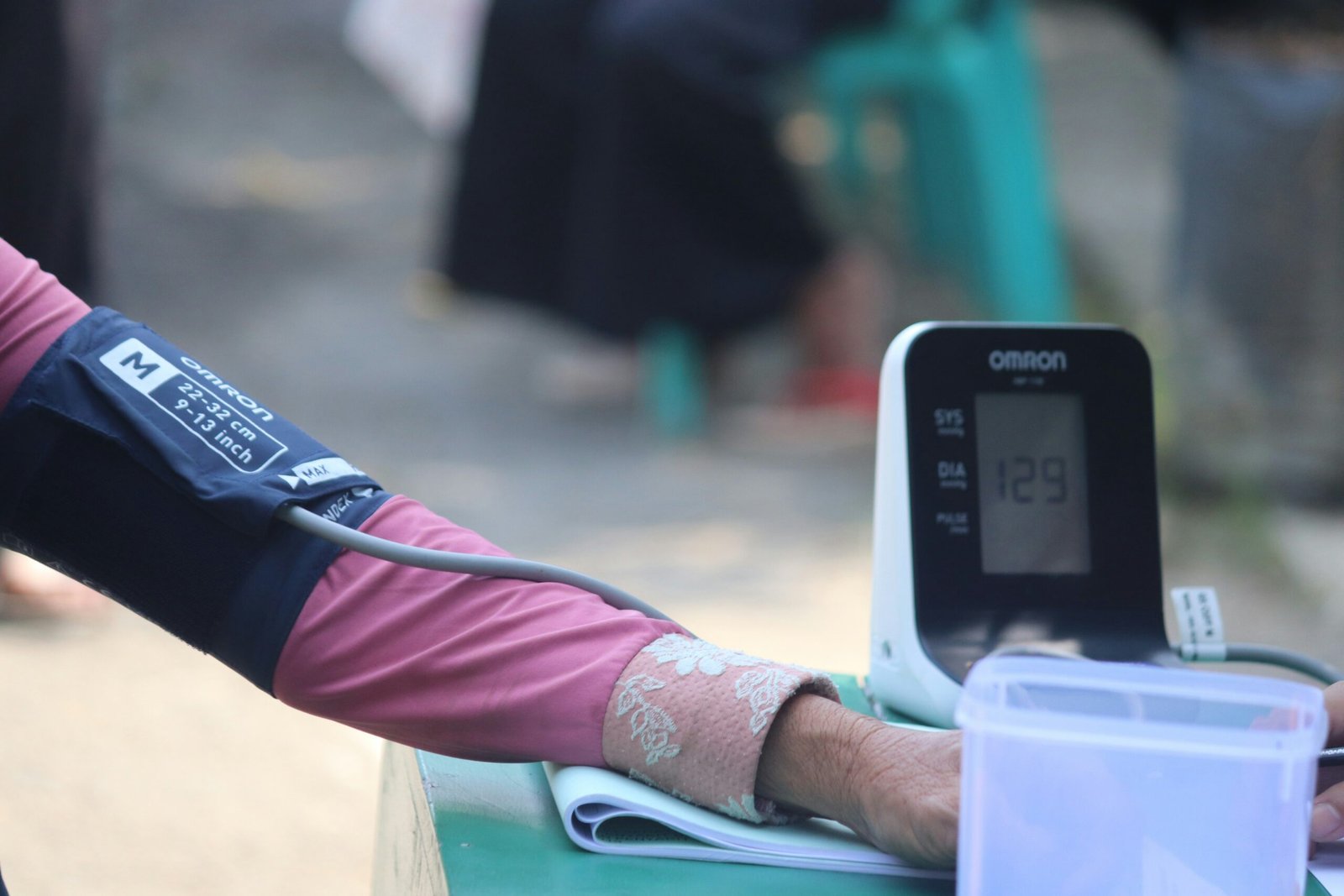
Understanding high blood pressure is crucial for maintaining good health and preventing potential complications. The condition is often referred to as the “silent killer” because it typically does not cause noticeable symptoms. Many people may be unaware that they have high blood pressure until they experience a serious health event, such as a heart attack or stroke.
There are two types of high blood pressure: primary (essential) hypertension and secondary hypertension. Primary hypertension is the most common type and develops gradually over time. It is often caused by a combination of factors, including genetics, age, and lifestyle choices such as diet, physical activity, and smoking.
Secondary hypertension, on the other hand, is caused by an underlying medical condition, such as kidney disease, hormonal disorders, or certain medications. It typically appears suddenly and is more common in younger individuals.
High blood pressure can have serious consequences if left untreated. Over time, the excessive pressure on the arteries can damage the delicate lining, leading to the formation of plaque. This can result in atherosclerosis, a condition where the arteries become narrowed and hardened, reducing blood flow to vital organs such as the heart, brain, and kidneys.
When blood flow is restricted, the heart has to work harder to pump blood throughout the body, which can lead to heart failure. Additionally, reduced blood flow to the brain can result in a stroke, while decreased blood supply to the kidneys can cause kidney damage or failure.
Fortunately, high blood pressure can be managed through lifestyle modifications and, if necessary, medication. Lifestyle changes such as adopting a healthy diet, engaging in regular physical activity, maintaining a healthy weight, limiting alcohol consumption, and quitting smoking can significantly lower blood pressure levels.
In some cases, medication may be prescribed to control blood pressure. There are several types of medications available, including diuretics, beta-blockers, ACE inhibitors, angiotensin II receptor blockers, and calcium channel blockers. The choice of medication depends on various factors, such as the severity of the condition, the presence of other medical conditions, and individual response to treatment.
Regular blood pressure monitoring is essential for individuals with high blood pressure. This can be done at home using a blood pressure monitor or by visiting a healthcare professional regularly. By keeping blood pressure levels within a healthy range, individuals can reduce their risk of developing complications and improve their overall health and well-being.
Causes and Risk Factors
There are several factors that can contribute to the development of high blood pressure. Some of the most common causes include:
- Family history: If you have a family history of hypertension, you may be more prone to developing it yourself. High blood pressure can be hereditary, meaning that if your parents or close relatives have it, you are more likely to develop it as well. This is because certain genes can affect how your body regulates blood pressure.
- Age: As we age, our blood vessels become less flexible, which can increase the risk of high blood pressure. This is because the walls of the blood vessels naturally become stiffer and less elastic over time. Additionally, as we age, the risk of developing other health conditions that can contribute to high blood pressure, such as kidney disease and diabetes, also increases.
- Unhealthy lifestyle: Poor diet, lack of physical activity, smoking, and excessive alcohol consumption can all contribute to high blood pressure. A diet high in sodium, saturated fats, and cholesterol can increase blood pressure levels. Lack of regular exercise can lead to weight gain and obesity, which are risk factors for hypertension. Smoking damages blood vessels and raises blood pressure, while excessive alcohol consumption can also raise blood pressure levels.
- Obesity: Being overweight or obese puts extra strain on the heart and can lead to hypertension. Excess body weight increases the volume of blood in the body, which in turn requires the heart to pump harder to circulate the blood. This increased workload on the heart can lead to higher blood pressure levels.
- Chronic conditions: Certain medical conditions, such as kidney disease, diabetes, and sleep apnea, can increase the risk of high blood pressure. Kidney disease affects the body’s ability to regulate fluid and electrolyte balance, which can lead to increased blood pressure. Diabetes, particularly type 2 diabetes, is closely linked to high blood pressure as both conditions share common risk factors, such as obesity and unhealthy lifestyle habits. Sleep apnea, a condition characterized by interrupted breathing during sleep, has been associated with hypertension due to the stress it puts on the cardiovascular system.
By understanding the causes and risk factors of high blood pressure, individuals can take proactive steps to prevent or manage the condition. Making lifestyle changes such as adopting a healthy diet, engaging in regular physical activity, quitting smoking, and moderating alcohol consumption can all help reduce the risk of developing high blood pressure. Additionally, managing chronic conditions and maintaining a healthy weight can also play a significant role in preventing hypertension.
Symptoms and Complications
High blood pressure is often referred to as the “silent killer” because it typically has no symptoms in the early stages. This is why regular blood pressure checks are crucial for early detection. However, as the condition progresses, some people may experience symptoms such as:
- Headaches
- Dizziness
- Shortness of breath
- Chest pain
- Visual changes
- Fatigue
In addition to these symptoms, high blood pressure can lead to serious complications if left untreated. These complications can affect various organs and systems in the body, including:
- Heart disease: Over time, the increased pressure on the walls of the arteries can cause them to become damaged and narrowed. This can lead to the development of heart disease, such as coronary artery disease or heart failure.
- Stroke: High blood pressure is a major risk factor for stroke. When the blood vessels supplying the brain are damaged or blocked due to high pressure, it can result in a stroke, which can cause long-term disability or even death.
- Kidney damage: The kidneys play a crucial role in filtering waste products from the blood. When blood pressure is consistently high, it can damage the blood vessels in the kidneys, leading to kidney disease or even kidney failure.
- Eye problems: The tiny blood vessels in the eyes can also be affected by high blood pressure. This can result in various eye problems, including retinopathy, which can cause vision loss or blindness.
- Peripheral artery disease: High blood pressure can cause the arteries in the legs and feet to become narrowed or blocked. This condition, known as peripheral artery disease, can result in pain, numbness, and difficulty walking.
- Sexual dysfunction: In some cases, high blood pressure can contribute to sexual dysfunction in both men and women. It can affect the ability to achieve or maintain an erection in men, and it can decrease sexual desire and arousal in women.
It is important to note that these complications are not guaranteed to occur in every individual with high blood pressure. However, the risk of developing these complications increases significantly if the condition is left untreated or poorly managed. Therefore, it is essential to monitor blood pressure regularly, make lifestyle changes, and follow the recommended treatment plan to prevent or minimize the risk of these complications.
Diagnosis and Treatment
Diagnosing high blood pressure is usually done through a simple blood pressure measurement. A healthcare professional will use a cuff wrapped around your arm to measure the pressure in your arteries. If your blood pressure consistently reads above 130/80 mmHg, you may be diagnosed with hypertension.
Treatment for high blood pressure typically involves lifestyle changes and, in some cases, medication. Lifestyle modifications may include adopting a healthy diet, such as the DASH (Dietary Approaches to Stop Hypertension) diet, engaging in regular physical activity, limiting alcohol consumption, quitting smoking, and managing stress.
If lifestyle changes alone are not enough to control your blood pressure, your doctor may prescribe medication to help lower it. There are several types of medications available, including diuretics, angiotensin-converting enzyme (ACE) inhibitors, angiotensin II receptor blockers (ARBs), beta-blockers, and calcium channel blockers.
Diuretics are medications that help your body get rid of excess water and salt through increased urine production. They work by reducing the amount of fluid in your blood vessels, which in turn lowers blood pressure. Examples of diuretics include hydrochlorothiazide and furosemide.
ACE inhibitors are medications that block the action of an enzyme called angiotensin-converting enzyme, which is responsible for producing a hormone called angiotensin II. Angiotensin II causes blood vessels to narrow, leading to increased blood pressure. By blocking the production of angiotensin II, ACE inhibitors help relax and widen blood vessels, lowering blood pressure. Examples of ACE inhibitors include lisinopril and enalapril.
ARBs are medications that block the action of angiotensin II by binding to its receptors, preventing it from causing blood vessels to narrow. This leads to relaxation and widening of blood vessels, resulting in lower blood pressure. Examples of ARBs include losartan and valsartan.
Beta-blockers are medications that block the effects of adrenaline on the heart and blood vessels. By doing so, they reduce the heart rate and the force of contraction, which lowers blood pressure. Beta-blockers also help relax blood vessels, further contributing to blood pressure reduction. Examples of beta-blockers include metoprolol and propranolol.
Calcium channel blockers are medications that prevent calcium from entering the muscle cells of the heart and blood vessels. This relaxes and widens the blood vessels, reducing blood pressure. Calcium channel blockers also decrease the force of contraction in the heart, further lowering blood pressure. Examples of calcium channel blockers include amlodipine and diltiazem.
It is important to note that the choice of medication may vary depending on factors such as your overall health, the presence of other medical conditions, and any potential side effects. Your doctor will work with you to determine the most appropriate treatment plan for your specific situation.
Prevention
While high blood pressure cannot always be prevented, there are steps you can take to reduce your risk:
- Maintain a healthy weight: Obesity is a major risk factor for high blood pressure. By maintaining a healthy weight, you can reduce the strain on your heart and blood vessels, lowering your chances of developing hypertension.
- Eat a balanced diet: A diet rich in fruits, vegetables, whole grains, and lean proteins can help lower your blood pressure. Avoiding foods high in sodium and saturated fats is also important, as these can contribute to hypertension.
- Exercise regularly: Engaging in regular physical activity can help lower your blood pressure and improve overall cardiovascular health. Aim for at least 150 minutes of moderate-intensity exercise or 75 minutes of vigorous-intensity exercise per week.
- Avoid excessive alcohol consumption: Drinking alcohol in moderation is generally considered safe for most people. However, excessive alcohol consumption can raise blood pressure and increase the risk of developing hypertension. Limit your alcohol intake to moderate levels (up to one drink per day for women and up to two drinks per day for men).
- Quit smoking: Smoking damages blood vessels and increases the risk of heart disease, including high blood pressure. Quitting smoking is one of the most effective ways to reduce your risk of hypertension and improve your overall health.
- Manage stress: Chronic stress can contribute to high blood pressure. Finding healthy ways to manage stress, such as practicing relaxation techniques, engaging in hobbies, or seeking support from loved ones, can help lower your blood pressure and improve your well-being.
- Get regular check-ups: Regular check-ups with your healthcare provider are essential for monitoring your blood pressure and overall health. Your doctor can help identify any early signs of hypertension and provide guidance on how to manage and prevent it.
By incorporating these preventive measures into your lifestyle, you can significantly reduce your risk of developing high blood pressure and improve your overall cardiovascular health.


